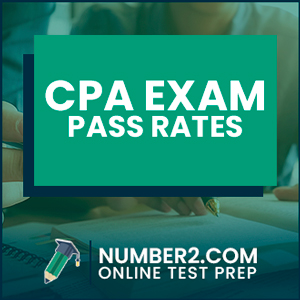 What is the CPA Exam Passing Rate?
What is the CPA Exam Passing Rate?
According to the AICPA the historical average CPA exam pass rate is approximately 50% depending on the exam section.
This low of a passing rate makes the CPA exam one of the toughest professional exams out there. It has 4 different sections with each CPA exam part having an average pass rate of around 50%. That’s not good.
It is important to note that the different sections have differential pass rates because different complexities of materials and content are covered on each section. Thus, some exam sections are considered easier than others.
Let’s take a look at the most current CPA exam passing rates and analyze the scoring trends to see if they are going up or going down.
Latest CPA Exam Pass Rates by Year Analyzed
Every quarter the AICPA publishes the average CPA exam pass rates for that period. This gives CPA candidates a good idea of what to expect on their next exam date. As the CPA exam keeps changing and evolving, so do the passing rates.
Here are the pass rates for each of the previous 13 years.
2023 CPA Exam Pass Rates
| CPA Exam Section | Q1 | Q2 | Q3 | Q4 | Cumulative |
|---|---|---|---|---|---|
| AUD | 47.01% | N/A | N/A | N/A | 47.01% |
| BEC | 56.98% | N/A | N/A | N/A | 56.98% |
| FAR | 41.82% | N/A | N/A | N/A | 41.82% |
| REG | 58.63% | N/A | N/A | N/A | 58.63% |
Not all of the 2023 pass rates have been published yet, but you can see a clear downward trend from the 2022 rates. This could be do to the current CPA exam changes or the newly updated 2023 CPA exam blueprint.
2022 CPA Exam Pass Rates
| CPA Exam Section | Q1 | Q2 | Q3 | Q4 | Cumulative |
|---|---|---|---|---|---|
| AUD | 46.35% | 49.13% | 48.67% | 47.21% | 48.16% |
| BEC | 57.33% | 61.53% | 59.91% | 60.30% | 59.68% |
| FAR | 44.95% | 45.66% | 44.30% | 40.67% | 44.93% |
| REG | 60.03% | 61.25% | 61.78% | 56.41% | 61.10% |
Over the last four quarters, the pass rates for each section of the CPA showcased quite a range, 45% – 63%. The highest pass rate was witnessed in the BEC (Business Environment and Concepts) section, and the lowest pass rate was in the FAR (Financial Accounting and Reporting) section.
The BEC, commonly known as the straight forward segment in the CPA, witnessed a 62.83% pass rate in 2021. While this is the highest in the range, it is a 3% decrement from the average 2020 BEC pass rates. Following close in the REG section, with a 59% average pass rate in 2021. So, it can be stated that students attempting the CPA in 2022 should probably lead with either of these two sections.
On the other hand, the AUD and FAR sections had a much lesser pass rate. AUD was at 54% while FAR was at an all time low of 44.7%. So, students who are extremely sure of their strengths can consider leading with the toughest section, which is FAR. Since the FAR section comprises of a series of comprehensive questions, it is also the most time-consuming.
Overall, the pass rates for each individual segment fell in the past year. However, this is not to be taken as a moment of downfall, as it is important to note that the pass rate for CPA is always rising and falling.
Historical CPA Exam Passing Rates
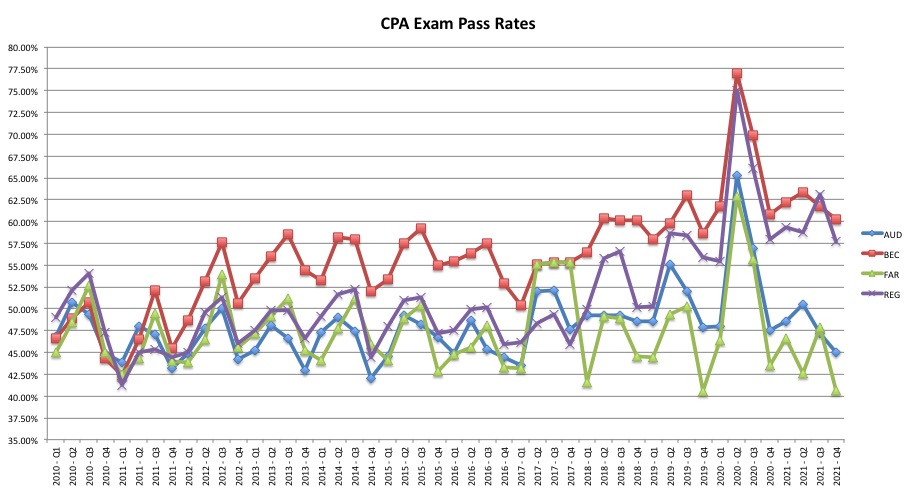
The historical CPA exam passing rates are interesting to look at because it shows how the exam has changed over the last 13 years. There was a large spike in passing scores 2020 mainly due to the testing centers being closed and the exam changing.
After 2020 the pass rates decreased from their high in 2020 but they stabilized higher than their pre-2020 highs. Thus, more candidates are passing the exam post 2020 than pre-2020.
CPA Exam Passing Rate by Section Compared
Every year there is quite a bit of fluctuation in each section of the CPA. This is mainly due to the changing content covered on each exam section. It’s common for an exam section to have a lower pass rate the first year new materials and concepts are introduced on the exam.
Let’s go through each section to realize how the fluctuating pass rates can help you make a decision when to take the CPA exam.
AUD Passing Rates
Here is a graph and table that illustrates the AUD exam section passing rates for the last 10+ years.
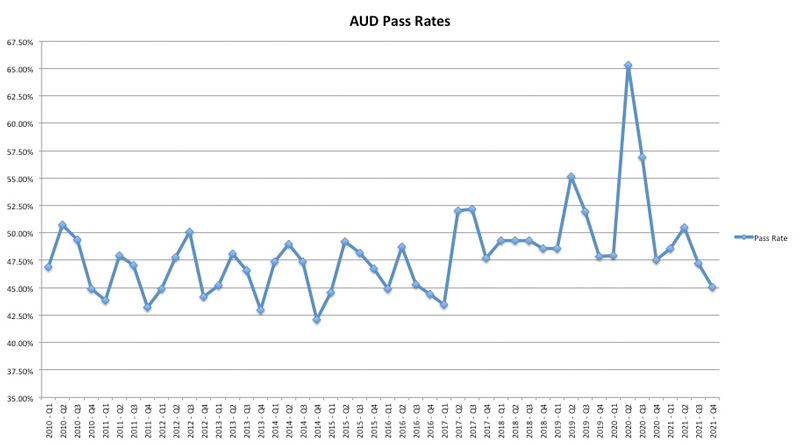
| CPA Exam Year | AUD Pass Rate |
|---|---|
| 2023 | 47.01% |
| 2022 | 48.16% |
| 2021 | 49.98% |
| 2020 | 52.84% |
| 2019 | 51.01% |
| 2018 | 50.97% |
| 2017 | 48.59% |
While last year the pass rate for the AUD section fell by 3%, it is not something alarming. The pass rate can be seen as always being close to 50%; and the 2021 pass rates still show the exact same range.
AUD is consistently one of the lowest passing CPA exam sections, second only to FAR. Most candidates struggle with auditing topics because they are rarely covered in college. In fact, most CPA candidates only take a single auditing course in college before taking the CPA exam. Also, this subject does not have much overlap with other CPA exam topics. Thus, many candidates struggle with the auditing section.
BEC Passing Rates
Here is a graph and table that illustrates the BEC exam section passing rates for the last 10+ years.
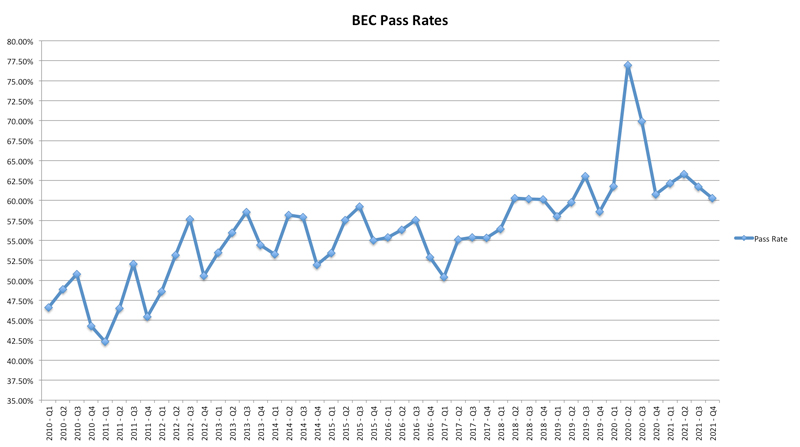
| CPA Exam Year | BEC Pass Rate |
|---|---|
| 2023 | 56.98% |
| 2022 | 59.68% |
| 2021 | 61.94% |
| 2020 | 65.56% |
| 2019 | 59.98% |
| 2018 | 59.35% |
| 2017 | 52.99% |
The BEC section almost always has the highest pass rates of any CPA exam section. With typical passing rates of 55% or more, BEC is widely considered the easiest CPA exam section.
This is why first time test takers prefer to attempt this section before the others. Not only will you able to complete it quickly, but you will also get a boost of confidence by performing well in the first section you attempt.
In the last few years, BEC was actually surpassed by FAR as the most passed CPA exam section for a few months. This didn’t last long as the BEC passing rates went back up just a few short months later.
FAR Passing Rates
Here is a graph and table that illustrates the FAR exam section passing rates for the last 10+ years.
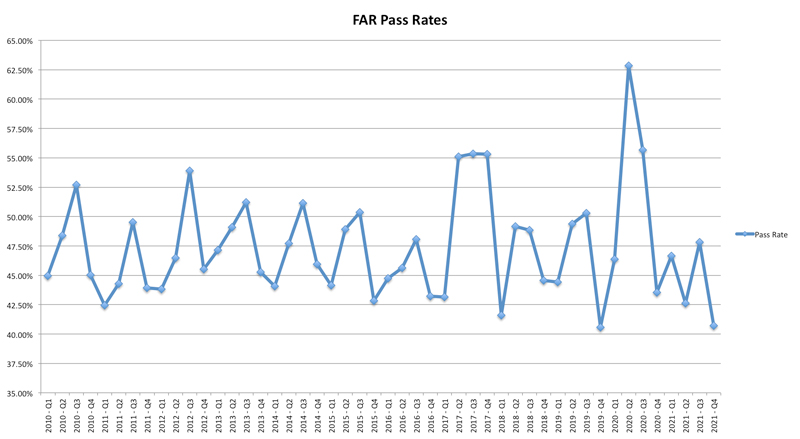
| CPA Exam Year | FAR Pass Rate |
|---|---|
| 2023 | 41.82% |
| 2022 | 44.93% |
| 2021 | 44.54% |
| 2020 | 49.98% |
| 2019 | 46.31% |
| 2018 | 46.22% |
| 2017 | 44.42% |
The FAR exam section is typically considered the hardest CPA exam section because it is the longest and usually has the lowest passing rate. This has been consistently true for the last 5 years, as FAR has been the lowest performing exam section with pass rates under 45%.
While this is the section with the largest drop in pass rates, it is fairly noticeable that 2020 had an unusually high pass rate. So, this drop is actually bringing it back to the average of 45% pass rate. So, perhaps this is something you would want to attempt in the Q3.
REG Passing Rates
Here is a graph and table that illustrates the REG exam section passing rates for the last 10+ years.
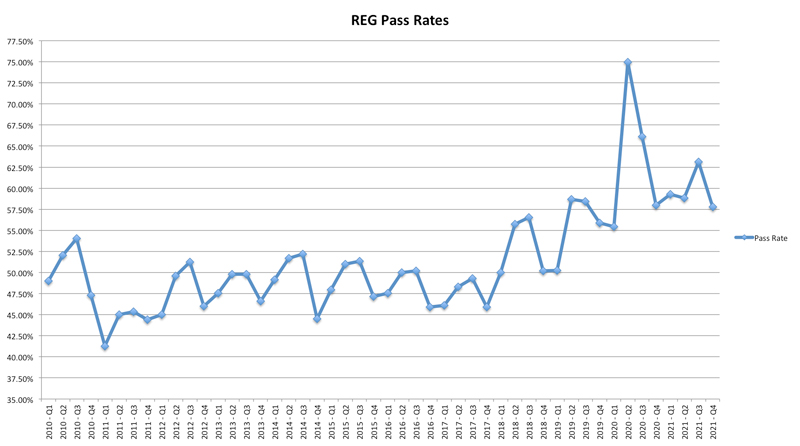
| CPA Exam Year | REG Pass Rate |
|---|---|
| 2023 | 58.63% |
| 2022 | 61.10% |
| 2021 | 59.88% |
| 2020 | 62.29% |
| 2019 | 56.34% |
| 2018 | 53.16% |
| 2017 | 47.24% |
The REG section has seen increased passing rates for the last 5 years with a current pass rate of 61%. That means that in 2022 Regulations had the highest passing rate out of any CPA exam section. It was even higher than BEC! This speaks to many of the changes the AICPA has made to the REG section in the last two years. Many candidates are finding this section much easier than in years past.
Since the Regulations exam covers business law and the tax code, the content on the exam is constantly changing. The AICPA makes sure that candidates know when tax code updates will appear on the exam, so you will have plenty of notice which version of the tax code you will need to study before you show up on exam day.
CPA Exam Pass Rates by Age Group
Pass rates for the CPA exam differ according to age as well. Younger candidates, especially those still in college, fare much better than older candidates who have been out of college for many years. This is often due to fact that the CPA exam is an academic exam. If you haven’t take an accounting course in a number of years, you’ll need to brush up on the concepts a bit more.
Here is a table that illustrates the CPA exam passing rates by age group.
| Age | CPA Exam Passing Rate |
|---|---|
| 22 and younger | 68.4% |
| 35 and older | 37.1% |
As you can see, younger CPA candidates have a much easier time passing the exam than older candidates. In addition to the amount of time since college graduation, older candidates typically have busier schedules with less time to study for the CPA exam than younger candidates.
CPA Exam Pass Rates by University
CPA pass rates also vary by University. This makes sense because colleges teach different levels of curriculum that will prepare students differently to take the CPA exam.
Here’s a table of the top 10 accounting college programs along with their students’ CPA exam passing rates.
| University Accounting Programs | 2021 CPA Exam Pass Rate |
|---|---|
| University of Texas at Austin | 89.5% |
| Brigham Young University | 89.4% |
| Wake Forest University | 88.8% |
| Boston College | 88.3% |
| University of Michigan-Ann Arbor | 88.2% |
| University of Florida | 86.4% |
| University of Virginia | 84.8% |
| Texas A&M | 82.9% |
| University of Wisconsin-Madison | 82.9% |
These CPA passing statistics are good to know if you are trying to decide which University or college to attend. You want to enroll in a program that not only prepares you to pass the CPA exam but one that prepares you for your future career as a Certified Public Accountant.
CPA Pass Rate Seasonal Trends
When you look at any of the pass rate graphs you can see a trend throughout the year. Many candidates think that the exam changes throughout the year and is easier or harder in different quarters. Thus, they try to take the exam in a quarter with a higher passing rate.
This myth isn’t true. The exam is the same all year with the standard material changes throughout.
I think the only reason when the pass rates change from season to season is that people’s lives change. Candidates are busier during the 4th quarter because of the holiday season. Likewise, tax accountants are busier in the 1st quarter because of tax season. Thus, the passing rates are lower. It has nothing to do with the exam changing.
Reasons For Low Pass Rate In CPA
Apart from the fact that the CPA exam is critically tough and features a lot of comprehensive sections, there are a few reasons which add to the generally low pass rates.
Most people don’t study hard enough
If you are someone who thinks a general knowledge of the subjects will get you through the CPA, it’s going to be a tough journey for you. Most candidates spend hours practicing mock CPA tests and specific sections to ensure that they manage to stay within the pass rates.
Most people don’t discipline themselves and put in the time
CPA requires a level of discipline that many are not ready to align themselves to. You will have to practice every day and stick to a plan that you have created before the entire process begins.
People have jobs, families, and lives
Yet another reason why younger candidates are able to pass more in the CPA. They have lesser aspects in life keeping them distracted.
How To Increase Your Chances Of Passing CPA
Set a schedule
While most people don’t realize this, creating a detailed schedule will be of huge help in ensuring that you pass the CPA exam in one go!
Use a course to study
There are plenty of online courses to help you prepare. Make sure to compare them and choose one that is personalized and provides enough practice.
Get rid of distractions
This is the time to focus on yourself and your end goal. Only then will you be able to succeed without a doubt!
FAQ
Here are some of the most common CPA exam passing rate questions.
Is there an upward trend in pass rates of the past 5 years? Why?
The trend in the CPA pass rates are always fluctuating. While there is an overall upward trend, year on year reduction of pass rates is also noticeable. This is because the pass rates for each segment of the CPA are prone to fluctuations as well.
Is there a seasonal trend in pass rates?
Yes, CPA pass rates in the early quarters (Q1 and Q2) are lower than that of latter quarters.
Is the Exam easier in some months?
No, the exam remains the same throughout all quarters. But, you may have more time to prepare if you attempt in the later quarters.
Should I schedule my exam based on pass rates?
While the pass rates can serve as a sort of guidance, you should schedule your exams based on your schedule and ability to prepare for the exam. Average pass rates don’t matter if you don’t have enough time to study on your own.
Time to Start Studying
Now you know what you are up against. Most people fail at least one section of the exam before passing the entire thing, but don’t get discouraged. Just set a study schedule and stick to you. Analyze the changes in the exam and make a plan to beat the CPA in one go!
The best way to do this is with a CPA study guide. There’s no other way to learn everything that will covered on the exam. Get one that fits your learning style and get to work!

